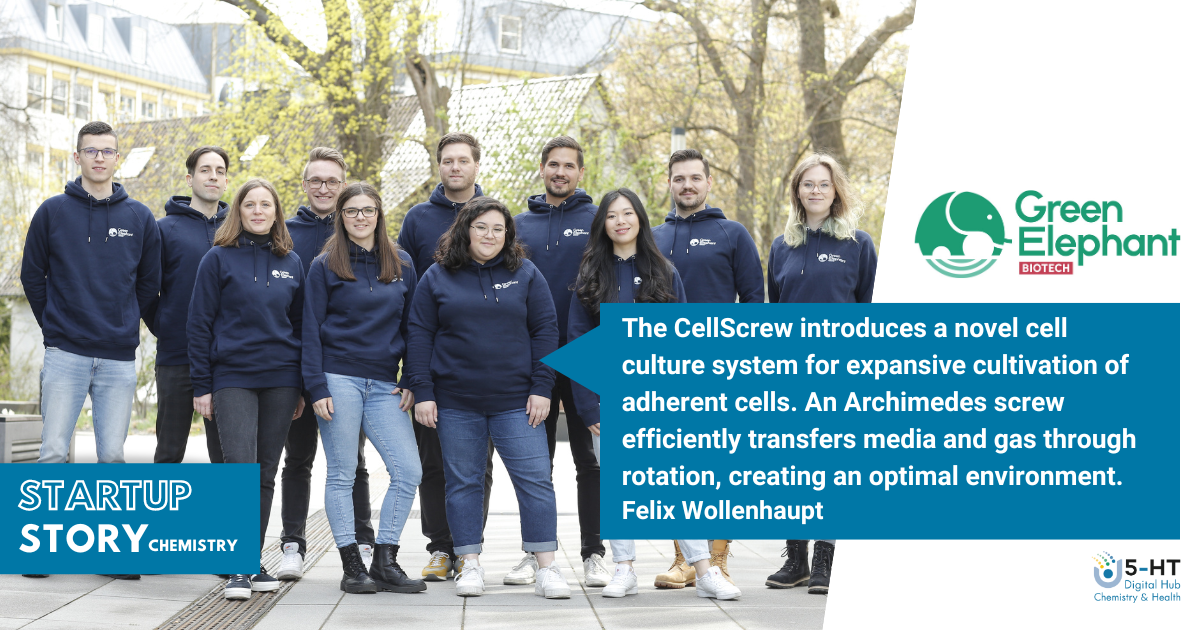Revolutionizing Adherent Cell Cultivation in the Chemical Industry
Laura Diez
In an era where innovative solutions are more in demand than ever in the chemical industry, CellScrew presents itself as a trailblazer in a groundbreaking development in cell cultivation. This novel cell culture platform enables the expansive cultivation of adherent cells in an efficient manner. An Archimedes screw mechanism efficiently transports media and gas through rotation, creating an optimal environment and expanding the growth surface by a factor of approximately 12, all without altering the dimensions of conventional roller bottles. However, what sets CellScrew apart is not just its performance but also its sustainability – the system is made from plant-based plastics (PLA) derived from renewable sources.
But what was the driving force behind the founding of this company, and how does CellScrew convince companies in the chemical industry to embark on pilot projects with them? In this interview with Felix Wollenhaupt, we take a closer look at the driving motivation behind the founding of CellScrew, how they persuade companies in the chemical industry to embrace their innovative solution, and where they see themselves in three years. Additionally, we explore how collaboration with 5-HT, the innovation network for health technologies, can support CellScrew on its journey. Get ready for insights into the future of adherent cell cultivation in the chemical industry.

How would you explain your solution in three sentences to a professional colleague in a chemical company?
The CellScrew introduces a novel cell culture system for expansive cultivation of adherent cells. An Archimedes screw efficiently transfers media and gas through rotation, creating an optimal environment. Multiple concentric cylinders enlarge the growth surface (approx. 12x) is formed by without changing the dimensions of conventional roller bottles. Notably, the CellScrew is sustainably made of plant-based plastics (PLA) produces from entirely renewable crops.
What problem motivated you to start the company?
There is a substantial problem of inefficient adherent cell cultivation in the biopharmaceutical industry. These cells are used in various fields to develop and produce therapeutics like vaccines or cell and gene therapies. Many patients rely on adherent cell cultivation, which is a surprisingly inefficient process that leads to an unmet demand of therapeutics. When Joel, my founding partner, visited a water playground with his niece, he watched an Archimedes screw that helped his niece transporting the water from the ground to the top through rotation. That was the start of the CellScrew. Hence, we want to facilitate the work of scientists to develop treatments effectively.
How do you convince a chemical company to set up a pilot project with you?
In contrast to adherent cell culture, modern suspension cell culture is more advanced in automation, enabling seamless process monitoring and control. Our vision for the CellScrew is an automated cell culture production platform for adherent cells, empowering scientists to cultivate adherent cells in a controlled, efficient environment, The CellScrew reduces material costs, manual handling steps, and carbon emissions. The automated approach aims to enhance consistency and process robustness while minimizing manual labor and operator tome. This platform serves as a foundation for cell and gene therapy manufacturing. Additive manufacturing of the Cell Screw allows us to reduce material usage by 80-85% and carbon emissions by up to 90%. As the pioneering sustainable single-use labware provider globally, we´re determined to create an impact, leading the charge to transform the scientific landscape. Our products, made from plant-based polymer polylactic acid (PLA), signify this revolutionary vision.
Who are your current customer (groups) and who do you want your potential customers to be?
Utilizing our stand-alone single-use system, CellScrew, we address academia, research organizations, and early-stage processes, including preclinical studies. For pilot production in clinical studies or scale-up, our closed system CellScrew can be a game changer. Bridging the gap, our fully automated production platform ensures consistent, high-quality adherent cell manufacturing at a production scale. Our target encompasses enterprises spanning drug product development and product reliant on adherent cell cultures. Currently our primary attention lies on the DACH and North American regions. However, there are plans to expand our presence across Europe and extend our reach to APAC.
Where do you see yourself in 3 years and how can 5-HT support you?
3 years from now, we want to be an international player offering various sustainable solutions for adherent cell cultivation and automation. Given the 5-HT network, we see great opportunities for collaboration with established companies. We could imagine 5-HT as a facilitator for successful cooperations.
5-HT Chemistry & Health Newsletter
Wollen Sie die neuesten Tech- und Branchennews, Veranstaltungen, relevante Infos aus dem Ökosystem und mehr?
Jetzt 5-HT Newsletter abonnieren Jetzt 5-HT Newsletter abonnieren
Werden Sie Teil des 5-HT Chemistry & Health
Tauschen Sie sich in unserem Ökosystem mit innovativen Startups und zukunftsorientierten Unternehmen aus. Wir freuen uns auf Sie!